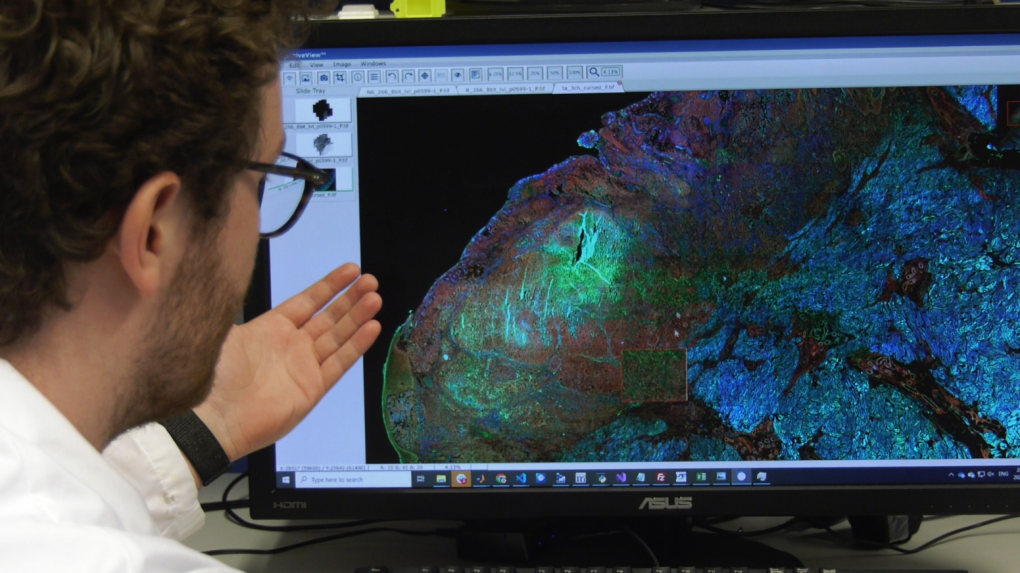How lasers and AI could help detect cancerous tissue in minutes
A cancer detecting system built from scratch at the University of Waterloo (UW) is nearing completion and could be on the market within two years.
An engineering team began work on the Photon Absorption Remote Sensing (PARS) system in 2017. It aims to speed up the process of detecting cancerous tissue in patients which, in turn, could speed up treatment.
“With one look, we can get all the answers,” Parsin Haji Reza, a professor and the project’s lead researcher at UW said.
It uses lasers to read a tissue sample, generate data and then feed that data to an AI system.
“The AI basically translates this data – this multi-dimensional data – into information and into images that doctors, pathologists and clinicians can read,” Reza said, adding it should take less than half an hour in total.
He said the traditional biopsy process involves taking a piece of tissue, dividing it, dyeing the sections and then analyzing them under a microscope to look for cancer markers.
 An engineering team at UW began work on the Photon Absorption Remote Sensing (PARS) system in 2017. (CTV News/Stefanie Davis)
An engineering team at UW began work on the Photon Absorption Remote Sensing (PARS) system in 2017. (CTV News/Stefanie Davis)
It sometimes takes weeks or months for patients to get their results back. The PARS system removes some of those steps.
“[It allows] us to see those same features that are being recovered with chemical staining just by looking at the response to the absorption of light,” PHD candidate and student lead Ben Ecclestone said.
Reza said speeding up the process is important to patients, clinicians and the health care system because of the money, time and stress caused by the current model.
The PARS system has already been used in clinical trials and proved to be highly accurate. The goal is for a prototype to be tested in the field later this year, and then go to market.
“We’d like to deploy this into clinical settings where we could actually start testing this in a real world scenario rather than a lab environment that we’re working in now,” Ecclestone said.
CTVNews.ca Top Stories

Trudeau to attend NATO leaders' summit as Russia escalates aggression toward Ukraine
Prime Minister Justin Trudeau will be gathering with NATO leaders today to mark the 75th anniversary of the defensive alliance as Russia escalates its aggression towards Ukraine.
How a new incubator is supercharging women-focused health startups in Canada
Experts say opportunities for innovation in women's health care exist in Canada, but investment in research and business is not where it needs to be. Here's how Femtech Canada, an organization launched earlier this year, is helping to close the gender gap in health care.
Five things to know as Canada meets Argentina in Copa America semifinal
After a dramatic win over Venezuela in the Copa America quarterfinal, the Canadian men’s soccer team takes on Argentina in a David versus Goliath semifinal on Tuesday night.
How much more likely was Eastern Canada's heat wave because of climate change?
Federal officials are set to say how much more likely Eastern Canada's heat wave was because of human-caused climate change.
Kyiv mourns as rescuers sift piles of rubble at a children's hospital hit by a Russian missile
Rescuers searched the rubble at a children's hospital Tuesday for more dead and wounded, Ukrainian President Volodymyr Zelenskyy said, a day Russian missiles slammed into the facility and cities across the country in a massive daytime barrage. The death toll from the strikes rose to 42, officials said.
'Nobody said anything': Former student recalls sexual advances by Frank Stronach
A former student and scholarship recipient at the company once helmed by Frank Stronach is speaking out about an “unwelcome but not illegal” sexual interaction involving the billionaire in the 1980s, when he was in his 50s and she was 19 years old.
Canadians less optimistic about finances amid worries about inflation, income: survey
Canadians are feeling less optimistic about their finances, with respondents worried about inflation, income levels and a potential recession at the midpoint of the year.
Ex-Quebec junior hockey players jailed for sexual assault of teen at hotel in 2021
Two former Quebec junior hockey players were handed prison sentences Monday for sexually assaulting a minor at a hotel in June 2021 in the aftermath of a Victoriaville Tigres championship celebration.
CFIA recalls brands of almond, cashew, coconut and oat milk due to Listeria concerns
The Canadian Food Inspection Agency says numerous Silk and Great Value brand plant-based refrigerated beverages are being recalled due to Listeria concerns.

































